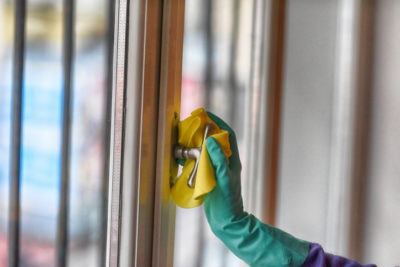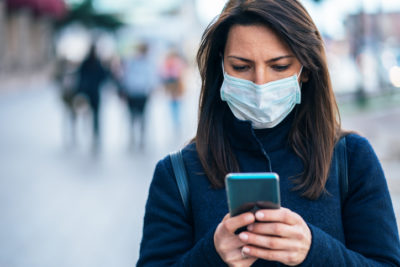
Never has the difference between office and deskless workers been more pronounced than it is in the midst of COVID-19. The term “deskless worker” refers to anyone who doesn’t do their job primarily on a computer — think factory workers, cooks, and cashiers. While members of the workforce who can do their jobs from a laptop anywhere have hunkered down in make-shift home offices, deskless workers face one of two scary options:
- Unemployment
- A job that puts them at risk for exposure to an invisible and aggressively infectious virus
Whether your workforce is online, offline, or mixed, employers everywhere need to take proactive measures to support essential employees as the world weathers the far-reaching consequences of COVID-19. That might mean outfitting employees with the equipment they need to create an effective work-from-home set up. It might mean sharing stress management techniques and providing support for those struggling mentally with the adjustment. Or maybe it means increased flexibility in working hours to accommodate caring for children who are home from school.
The effects of COVID-19 are abundant and far-reaching, so the forms of support you offer your employees should be too. We’ve already shared resources on how to ease the shift to remote work and keep morale high in the midst of the crisis. This article focuses specifically on things employers can do to assist deskless workers bravely continuing to do their jobs through this crisis.
But First: Support for the Unemployed
Present section aside, this article assumes you’re looking for ways to support offline employees who are still actually working. Unfortunately, many employers have had to lay off or significantly reduce the hours of their offline employees. Employees working in restaurants, retail, hospitality, and other “non-essential” services can’t do their jobs from home, and as many of these businesses shut down for the foreseeable future, former employees face an indefinitely long future without work.

While those you may have had to lay off aren’t technically your employees anymore, they were once. In some cases, employers expect that they will be again — it’s not uncommon for a business to execute layoffs with the explicit intention to rehire. In these strange, unprecedented times, it’s critical you also find ways to support those former employees who are no longer on your payroll.
In addition to offering fair severance packages and using the full extent of government support, you can also refer laid off employees to privately organized relief funds that can be an essential lifeline in a financially difficult situation. Create or compile resources your employees can turn to — whether they are specific to geography, industry, or demographic — and try to take as much of the legwork out of the process of securing resources as you can. Have these resources readily available in an easily accessible document, spreadsheet, or web portal your former employees can access to take the legwork out of finding the relief they need.
Do not leave your non-essential deskless workers to fend for themselves at such a difficult time. Not only will you be faced with a reluctant returning workforce, it will be taken as a sign that your company doesn’t care for its people. This makes you a significantly less appealing employer to prospective new hires in the future.
4 Ways to Support Deskless Workers in the Midst of COVID-19
So, your offline employees have been deemed essential. That means, despite the fact that there’s an aggressively contagious virus spreading across the globe, your employees will often forego social distancing recommendations and heroically put themselves at risk to do their essential jobs.

Whether you’re on the front lines with your offline employees or not, take a moment to consider the sacrifice these employees are making to keep the world in order. Grocery clerks, gas station attendants, delivery drivers, and manufacturers (among many others) are all putting their health on the line to keep the world afloat at one of the most trying chapters in modern history.
They should be treated like the heroes they are.
The following recommendations are intended to minimize risk and create a work environment where appreciation runs deep and support comes from all around. These strategies to support essential employees during COVID-19 will help your offline employees weather the still-unfolding global pandemic as well as they can, all things considered.
1. Make Safety a Top Priority
While your deskless workers can’t logistically follow all the best practices for social isolation, they’re still as prone to illness and injury as any human and should take precaution wherever possible.

Do not ask employees to work when sick. In the face of a global pandemic, to do so would be definitively immoral — it puts you, your employees, your customers, and the global population at risk. If employees feel anything but healthy, make it easy for them to stay home until they’re well again. It’s up to you, the employer, to ensure shifts can be covered and safety maintained. Whether that means having a backup employee “on call” for every shift or filling in and doing the work yourself, you need a plan to make sure your essential offline employees only work when healthy.
Additionally, look out for employee safety by upping your standards of cleanliness. Provide disinfectants and protective equipment as needed, and reconfigure all of your established sanitizing protocols to match the severity of the COVID-19 outbreak. Job function permitted, you might also ask employees to stay 6 feet away from customers and each other. Governments are beginning to mandate essential businesses to develop official social distance plans. Legal obligation or not, it’s a smart thing to do to look out for your employees safety. Given the gravity of the present situation, few measures would be too extreme.
2. Communicate, Communicate, Communicate
After you have mitigated physical risk as much as possible, you should focus on smooth logistical processes to keep unnecessary stress and frustration at bay throughout this difficult time. In good times and bad, clear communication is a pillar of successful management, and there’s no time like the present to refine your approach.

As the pandemic runs its course, policies, predictions, and best practices evolve every day. Think back to how dramatically different things were just three or four weeks ago. To support essential employees during COVID-19 effectively, you need an efficient, reliable way to communicate with all your employees. Whereas online workforces can easily rely on email and desktop messaging platforms to communicate, leaders of deskless workers must take particular care to ensure their communication strategy is accessible to all.
Deskless workers aren’t in front of their computers all day, but they usually have their mobile devices and check them throughout the day. If you’re not using one already, a mobile communication platform is a highly effective tool for communicating with offline employees in a timely way. It’s an accessible, one-stop location where employees can read all essential business updates prior to starting their shifts. To keep business running as smoothly as possible in a crisis, it’s critical your entire team be on the same page, and this kind of tool can help.
3. Recognize Employees as Heroes
For all the physical danger that comes with a deadly virus, it presents emotional stressors, too. Whether you’re adjusting to abrupt disruptions to daily life or mentally coping with the threat of physical illness, there are plenty of things about the current situation working against morale. When you are keeping essential offline employees as physically safe as possible and have logistical processes locked down, the next step to take to support these employees in COVID-19 is to boost their morale and recognize their valiant efforts.

As mentioned at the beginning of this article, these people are truly heroes. While much of the world practices privileged social distancing, essential offline employees are putting their health on the line to ensure the world keeps running. Like effective communication, employee recognition is always a recommended management tactic, but now more than ever, it’s an incredible tool to unite your team and improve the affective experience of work in a crisis. Be sure to pick a recognition platform with a built in mobile app so it’s inclusive and accessible to offline workers.
Use recognition to drive home the gravity of the contribution essential offline employees are making to the world at this time. Few tasks would be too small to warrant recognition: whether it’s taking an extra pass at disinfecting inventory or cracking a joke to keep colleagues smiling through a trying shift, recognizing employees for the ways they make difficult work better is a great way to support them through COVID-19. If you can, try to recognize them with more than just verbal praise — if anyone deserves a gift card or corporate discount right now, it’s essential deskless workers.
4. Ask Your Employees About What They Need
Our fourth and final recommendation for supporting essential employees through COVID-19 is simple, but incredibly important: ask your employees about what they need. Exactly none of us have experienced a global pandemic of this scale before, and we’re learning side-by-side the best strategies to get through it. Let employees know that it’s not only okay but encouraged for them to speak up about their needs at this time. Voicing challenges and concerns actually contributes to your company’s crisis management strategy via first-hand employee input. Communicate to employees that you want them to share their experiences and do your best to respond as promptly as possible.

Finally, as you continue to weather the storm that is COVID-19, don’t forget that the world is watching.
The way employers treat employees right now will not be soon forgotten. You should proactively support your essential offline employees (and all employees, for that matter) because it’s the right thing to do, but keep in mind that you’re also sending a public message about how your company treats its people. When we emerge from this pandemic, both your people and your business will be in a better position to get back on their feet if you’ve taken proactive measures to support essential offline employees throughout this crisis.
 Katerina Mery is a Marketing Specialist at Fond with a background in cognitive psychology and a passion for improving the way people live and work. She especially enjoys learning about how to accomplish this through rewards and recognition. In her spare time, you can find Katerina running outside, admiring art, and exploring the latest and greatest local restaurants.
Katerina Mery is a Marketing Specialist at Fond with a background in cognitive psychology and a passion for improving the way people live and work. She especially enjoys learning about how to accomplish this through rewards and recognition. In her spare time, you can find Katerina running outside, admiring art, and exploring the latest and greatest local restaurants.
